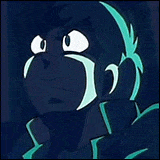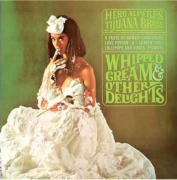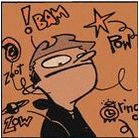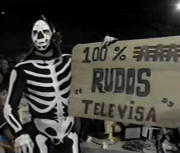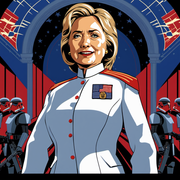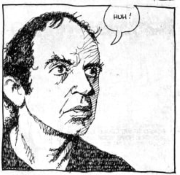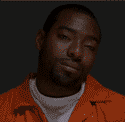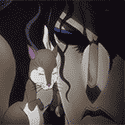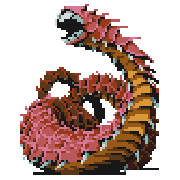|
Indian Art: a Concise History By Roy Craven. The last textbook I have left from my art history days. I had kept it because it read super well when I bothered to read a chapter for the Indian art class I was taking at the time so I promised myself I'd read it in full later. A decade later it's still written well and is an easy read but, the subtitle's not kidding: this is a very brief overview of thousands of years of artistic tradition that barely has time to touch all the highlights. I can see why my professor had it for the class, it would pair nicely with other, more in depth material. This book is a part of the Thames and Hudson "World of Art" series of books which from what I've gathered is a series of books about specific art subjects written by an expert on that particular subject. I have a couple others from it and am interested to see how they compare. And with that, I've sort of achieved my miniscule goal of reading five books this year if I cheat and count the Bloom County omnibus as a book.  Still some time left to make it a proper five books. Still some time left to make it a proper five books.
|
|
|
|

|
| # ? May 15, 2024 15:49 |
|
The Master and Margarita Fascinating as a look into that era of life in the Soviet Union and as a rumination on redemption and the role of evil in society.
|
|
|
|
The Complete Accomplice by Steve Aylett. Friend to all crawling and flying creatures of the Earth, Barny Juno pisses off a demon named Sweeney. Specifically Juno rescues an alligator that Sweeney was letting marinate in its own terror. This demon is something of a king in Hell and thus too big to manifest in the mortal realm to personally exact revenge without a serious expenditure. So Sweeney resorts to minions and schemes to pester and break poor Juno who doesn't seem to realize powerful malevolent forces are moving against him. He's too caught up in his own problems most of the time. Anyways that's just the setup. You really read Aylett for the wordplay and twisty bits. I also just picked up the collected Hyperthick also by Aylett. Pretty much the same word salad as Accomplice only this time the stories incorporate old adventure and detective comics that lapsed into public domain. From the looks of it Aylett blanked out the captions and word balloons and wrote his own script.
|
|
|
|
Fablehaven: Rise of the Evening Star by Brandon Mull: It turns out I borrowed the entire series as one e-book from the library, so I may as well read them all. This young adult book continues the story of Kendra and her dumbass annoying little brother Seth in the secret world of magical creatures at their grandparents' estate. Kendra is now fairykind and is just starting to experience her magic as a new threat looms. It introduces new, interesting characters, expands the world a bit more, and has one or two good twists. It also retcons some world rules from the first book with "well, it works that way but except in this specific scenario" as if the author had forgotten about them and an astute editor later pointed out the logic issues. I'll let it pass because I'm an adult man reading a middle grade book, so my standards are clearly pretty low for that kind of thing.
Good-Natured Filth fucked around with this message at 00:44 on Oct 15, 2022 |
|
|
|
Foucault's Pendulum I loved the opening parts, but ended up unexcited enough that I finished multiple books before coming back to it. Most of Brazil could've been well and truly excised and large portions end up feeling more like a shopping list of various conspiracies and conspiracy In jokes then anything particularly exciting. Really when you get down to it, if I'm buying a book about people falling into conspiracy delusions I've already bought that ticket. They don't need to sell me on them slowly steeping in the pot, just serve me the tea. The major themes also aren't all that interesting to me, people falling into their own ironic conspiracies was done quicker and better by Borges and the idea of having to create our own god out of meaningless was done better by the conversation with Morpheus in Deus Ex. Its an interesting and occasionally funny work that never manages to rise above the good level. Agliè is the man I aspire to be though.
|
|
|
|
The Haunting of Hill House by Shirley Jackson was absolutely terrifying. The book captures this feeling of slipping from dream to nightmare that I haven't experienced from any other horror. Unlike other horror, where there's a continual build up of tension with a few pressure releases until the big finale, Hill House does this tension-release-reset in every section where the characters act like the events of the night before weren't the most terrifying event of their lives. In a worse novel that would fall flat, but Jackson's writing makes it feel like waking from a bad dream... and then falling back into the nightmare 30 pages later.
|
|
|
|
Art Nouveau by Alastair Duncan. Another in Thames and Hudson's World of Art series. Since Art Nouveau is such a narrow time period of art this book is divided into type/medium of art, which is helpful as many artisans worked in several mediums. However, there is a dizzying array of names mentioned both famous and not that it's hard to keep up. Very list like: this book comes off best as a springboard, a suggestion of other possible artists to research in depth. I've only got one more book from this series to read (so you all won't have to suffer more reviews) but owing to how textbookish these seem I personally won't be getting more. Best reserved for the historical minded over those looking for art inspiration.
|
|
|
|
Retail Gangster: The INSANE, Real-Life Story of CRAZY EDDIE by Gary Weiss – Follows the life of Eddie Antar, who founded and ran the the Crazy Eddie chain of electronic stores that was popular in the NYC area and well known for the bombastic ads featuring radio DJ Jerry Carroll. Weiss goes into the rise of the Crazy Eddie retail stores, which was achieved by massive fraud (ie insurance fraud, charging but not paying sales tax, etc). It can be a little hard to keep up with the names, as most of the people helping Eddie with the scam were family and often named after other relatives, but Weiss includes the Antar family tree at the beginning of the book, which I found useful to refer to while reading.
|
|
|
|
How to Do Nothing: Resisting the Attention Economy by Jenny Odell The premise was good, and well-researched. A lot of engaging references to other books that I'm going to look into. The issue I had was the framework being constantly likened to her enjoyment of bird-watching. Since that topic does not interest me, there ended up being pages-long passages in each chapter that I completely tuned out from, preventing me from getting the most out of my time with the book. Maybe her upcoming book Saving Time will have less bird stuff?
|
|
|
|
Grieche sucht Griechin by Friedrich Dürrenmatt. It's the first time I've reading anything by him that isn't a crime novel, and the second time I've read something by him that has an alternate or additional ending, changing the story "for lending libraries" (i.e. giving it a happy love-story ending). It was a lot lighter in tone and content than I thought it would be. Not exactly any surprises, with either ending. A very Central European vibe to the whole thing, and also somewhat theatrical; not surprising considering the author was a Central-European dramatist. I still don't know what the message of the book was; I doubt it was the naff "you must let go of blah blah to be able to truly blah blah" lesson given by the president. The movie seems to be a gay romp (no not like that) with several scenes that have nothing to do with the book:  Slightly non-work-safe due to sixties belly buttons and oiled guys Slightly non-work-safe due to sixties belly buttons and oiled guys  https://www.youtube.com/watch?v=JWk9Z_uQIGA
|
|
|
|
Al Capp: A Life to the Contrary by Michael Schumacher and Denis Kitchen (2013). As the title suggests, this book follows the life of Al Capp, the creator of the comic strip Li'l Abner. It covers his life from his childhood to his rise to fame to fall towards the end of his life. The book focuses more on Capp than his creation, and gives more details on the feud he had with his former employer Ham Fisher, as well as the the various sexual misconduct scandals that contributed to his public fall from grace.
|
|
|
|
Project Hail Mary by Andy Weir. I had read The Martian before and liked it and my friend told me that Project Hail Mary was good so I just bought it without knowing what it was about. It was a long time since I was this hooked by a book, god drat.
|
|
|
|
The Passenger by Cormac McCarthy Not my favorite. The opening portion and the last chapter were the tremendous poetic McCarthy that I love, but there was a lot in the middle that was not compelling. Like, a less interesting Suttree. I did not like the parts with The Kid at all, so I will be interested to see if there is something in Stella Maris that might grant more value to the Alicia sections. Still interested in reading articles and analysis about the book, and may be able to revise upward with time.
|
|
|
|
In two days, I read Longitude: The True Story of a Lone Genius Who Solved the Greatest Scientific Problem of His Time. Hopefully navigation comes up often as a matter of import in the Aubrey-Maturin books.
|
|
|
|
Just finished He Who Fights Monsters which was a book recommended to me by my boss, that belongs in a genre I had never heard of before called LitRPG. The world building was fun and interesting, the narrative wasnt bad, but jesus did the author need an editor. This book could've been so much better. I'm not sure I liked it enough to read any of the sequels, not sure Im a fan of the genre, but was a decent enough read I guess. Then I did a complete 180 and read Of Mice and Men. Somehow someway I was never forced to read this in high school! Really enjoyed it, beautifully written and makes me want to pick up the Grapes of Wrath next.
|
|
|
|
Tarzan at the Earth’s Core by Edgar Rice Burroughs, which is a crossover between Tarzan and Pellucidar (Burrough’s hollow-earth series). It was brought to my attention as having gliding stegosauruses by the Common Descent paleontology podcast, so I couldn’t resist because I love outdated scienctific theories (Burroughs actually didn’t make up the gliding, that was real scientific theory). It was a fun pulp adventure story with Tarzan the ape-man and an American adventurer flying a blimp into the Earth through a hole at the north pole, where they run into sabertooth cats, terror birds, triceratops, pteranodons, various primitive tribes, pirates, lizard men, etc. The book is what you can expect from that description. Tarzan’s contempt for the weakness of civilization reminded me of Conan to the point where I looked up publication dates to see who had it first, and it was Tarzan. FPyat posted:In two days, I read Longitude: The True Story of a Lone Genius Who Solved the Greatest Scientific Problem of His Time. Hopefully navigation comes up often as a matter of import in the Aubrey-Maturin books.
|
|
|
|
BaseballPCHiker posted:Then I did a complete 180 and read Of Mice and Men. Somehow someway I was never forced to read this in high school! Really enjoyed it, beautifully written and makes me want to pick up the Grapes of Wrath next. You should definitely do that! Such a good book. Then, East of Eden
|
|
|
|
Currently reading through a bunch of stories about Jewish \ Ukrainian \ Jewish-Ukrainian boys dealing with the 1917 \ 1905 revolution. For some reason, this was a fairly popular literary sub-genre. Probably because the Soviet Union had a lot of Jewish writers eager to reminisce about the bygone era of their childhood, and at the start of the 20th century Jews mostly lived in Ukraine \ Belorussia \ Poland. There are a lot of ways to read these books, of course: As a triumph of a revolution against a seemingly eternal reign of darkness, destroyed because the people finally got the courage necessary to topple the tyrant in hopes of a better tomorrow (keep in mind or ignore the horrifying result according to your own political preferences). Paying attention to Ukrainian \ minority angle. These stories take place in Russia. Sure, sure - the Russian empire and \ or a specific nation within it. But really, as far as anyone is concerned, Russia. Everyone speaks Russian, worries about the fate of Russia, is connected to the Russian culture. Only negative or comic relief characters speak a single word of the local language (not too much of that, either). The Jewish angle. Same deal, basically. Nobody speaks Yiddish or Ukrainian, nobody is religious or respects Hebrew traditions. Palestine \ Zionism are obviously never mentioned. I don't care to do the required research, but I'm reasonably sure that actual Jews in Odessa \ Ukraine khutors probably didn't speak proper literary Russian, and the current stereotypical Jewish lingo is based on a censored version - 1920's \ 1930's writers eliding that particular pidgin, trying to translate the feel of it via grammatical structures and extended similes in place of actual Surzhik \ Yiddish phrases that would litter the local speech. Finally, there the nostalgic \ reminiscent aspect, which occasionally feel stronger and more sincere than the required message the work is intended to carry. Rybakov's "The Dirk" "The Bronze Bird" and "The Shot" (all fairly short, might as well be treated as one book) are really quite primitive. If you've ever heard of anything else Rybakov wrote, it's probably the Children of Arbat trilogy \ Heavy Sand, which are (to say the very least) not very pro-Stalinist. I mean, the man spent 3 years in a gulag before turning to writing. But nah - fairly simple kid-detective stories interspersed with work being done to establish proper class consciousness and political education. "What the deal with this dirk, which a murderous and evil White Army officer is trying to acquire?" "Is an evil and murderous White émigré trying to use recover treasure buried near his former mansion?" "Won't our detective work interfere with educating the comic relief pioneer on the importance of volunteering and not being so loving fat and stupid?" Extremely by the book, complete with mostly plot-irrelevant child class-enemies to be ritually humiliated. A lot of lectures on proper conduct, proper enthusiasm, education and prioritization, taken directly from the party line. The final story in the trilogy at least tries to make things a bit more ambiguous (even casually introducing a character from the Arbat series) but its a bit too little and too late. Kataev's "A White Sail Gleams" - the 1905 revolt in Odessa and the following pogroms, as viewed by an 8 year old and his toddler brother. Has a very strong sense of time and place. I'm far enough removed that I have no idea what anyone wears no matter how detailed the description (unless I care to GIS every other page) but I can picture everything from the dusty khutors to Odessa itself quite well. Would be interesting to read this alongside Babel, who generally feels no need to describe exactly how everyone were dressed and where they lived, just how they talked and acted. That attention to the autobiographical details of how things were so many years ago is actually far more important than the details of the narrative. The protagonist ends the book in the exact same place he started. The one surviving antagonist outright disappears halfway through, never getting his dues. I should check out the sequel, things probably improve on that end (as the protagonist is a teenager at that point). Lev Kassil's "Konduit and Schwambrania (aka The Black Book and Schwambrania)" . Another story about two brothers - studying at a Tzarist "gymnasium" while also roleplaying the fantastical land of "Schwambrania". Half the book (initially published in two parts, which probably accounts for the shift) is about the school life - unjust disciplinary measures (written up in the titular Black Book), absurd things taught by the teachers, brotherhood, rivalries and pranks among the students (the working masses in a microcosm). The other part has to do with WWI, the two revolutions, and the socialist makeover of this tiny town. You get a triumphant "and then the school was free from the feudal nonsense that ruled it thus far... and just trust us that everything was fine after that, no need to inquire after details". Apparently the writer wasn't really shameless enough to get into a socialist pioneer utopia a-la Rybakov. The unique angle of the story is how all these things are reflected in and change the children's fable land. Things they learn at school, in official propaganda, and osmose via "adult talk". Schwambrania has kings, wars, voyages, revolutions. There's a decent balance between how the children understood things at the time and the way the narrator fondly and ironically reminisces about their experiences. The book is dedicated to Kassil's real life brother and fellow writer, who was arrested and executed just half a decade after its publication. Unlike Rybakov and similar writers, to the best of my knowledge Kassil never bothered to denounce Stalin or the "excesses" of the 1930's. ... As a supplement to these triumphant revolutionary books, I'm reading the Vanyer brothers' last (or near last) novels - Петля и камень в зелёной траве & Евангелие от палача. About the crimes of the early 1950's coming back to haunt the protagonists decades later. Obviously very dark stuff when describing the purges of the late Stalinist era, but also pure edgy morbidness about the late 1970's - everyone is corrupt, the system has no point but can still smash you if you go against it or bring up old sins, the entire Soviet Union is one big gulag etc. Also a LOT of anti-semetism - presumably the Jewish former detectives were reminiscing about everything that was said to their face or behind their back. (I guess truly misanthropic main characters were fairly rare in USSR fiction, but surely going on about how people have a physical presence - they have body parts, they consume and excrete, they reproduce - was a bit worn out even at the time?) Written in the 1970's, hidden in a secret stash and published in 1990, exactly at the point at which no one cared any longer (which is why neither book is translated into English \ even mentioned online in any way shape or form). A good antithesis to both revolutionary fiction and to USSR nostalgia. As an aside - throughout the 80's, while this expression of pure hatred for their country and its establishment was laying in wait, the brothers kept on publishing proper socialist detective stories, with carefully explicated moral lessons about greed, the need to serve your country and countrymen, the bright communist future that awaits etc.
|
|
|
|
Finished Emma, I'd read Pride and Prejudice back in school and did not at all care for it. Recently however I discovered the Director Walt Stillman and having enjoyed so much his films such as Metropolitan I decided to read the works influencing himself chiefly among those Austen. And it was a pretty good time, given the rigidity of society at the time the novel feels rather light and open for how reserved the characters are, that is however an illusion masking the incredible amount of things happening between the scenes. Near every event is misconstrued by Emma and her fellows and the reader must be constantly vigilant at understanding what an event might mean to the principles instead of just relying on the conjecture of Ms.Woodhouse. If I ever hear about Maple Grove again however I will probably flip poo poo.
|
|
|
|
I've been reading a lot recently. The Spatterjay Trilogy by Neal Asher. The setting is unique and interesting. The characters are also fairly well developed, and it manages to juggle a bunch of subplots at once. I'm really glad I found this author. They write the type of story I really like. Gateway by Frederik Pohl. The main character is just kind of an rear end in a top hat, and not in an interesting way. I really wasn't a fan of the therapy session framing story. A whole lot of build-up without much actual payoff. It felt like it relied heavily on in-universe advertisements/documents/Book excerpts/etc... to punch up a rather unengaging story where not much happens. Not that it didn't have some interesting ideas, but it relied too much on the personal arc of an uncompelling main character. The Count of Monte Cristo this was a re-read. This is classic literature for a reason. The Scholomance Series by Namoi Novik. This was a series of diminishing returns. I liked the first and still liked the second book, but I wasn't that big of a fan of the final book. It just lost a lot of steam once the cast left the school. The author writes fan fiction and it really started to show the longer the series went on. The Anubis Gates by Tim Powers. A pretty good time travel story with some historical urban fantasy elements to make it not just have a standard time-travel plot. Fevre Dream By George R.R. Martin. I really like the setting and perspective from a steamboat captain. However, I feel that the vampire stuff doesn't do anything new or interesting. In my opinion another supernatural threat would have worked better. The best part is the steamboat stuff.. I think a HBO TV show adaptation would actually work really well for it, and there is plenty of room to pad things out without it feeling like filler.
|
|
|
|
I finished Sprinkled In The Stars by Violet Morley. It's a very sweet low-angst romance story with two main characters that feel like real people, and a cast of side characters in the form of a couple of families that bring warmth to the book. Best of all, it's one of the romance books where communication is absolute key and helps resolve what a lazier writer would've just used to create a bunch of unnecessary drama.
|
|
|
|
|
Fablehaven: Grip of the Shadow Plague by Brandon Mull: The third in this 5-part young adult series. The story continues for Kendra and her unable-to-have-character-growth, idiotic little brother Seth. We are introduced to larger elements of the world in this book - like a secret society of heroic knights that try to keep the other secret society of evildoers at bay... by acting like a clandestine evil organization. Kendra meets a love interest. Seth continues to be a loving idiot. More world rule retcons, more obvious plot twists. For all its flaws, it has its hooks in me, and I'm going to see the series through. The Mona Lisa Sacrifice by Peter Roman: The premise of this book is that when Jesus Christ resurrected, he was actually a different person since his soul had gone to heaven, and a new unknown soul had to be put into the body. He can never die, and he gets a high from killing angels and absorbing their power. He's played off as an anti-hero and reluctantly saves the day many many times. It mashes way too many mythos and legends together (a small list of characters introduced in this: Judas, Mona Lisa, King Arthur, Medusa, Tutankhamen, Gabriel) to make a coherent story. The writing is all over the place, and I can't fathom anyone finishing the (planned) trilogy.
|
|
|
|
IShallRiseAgain posted:
I liked Gateway, and most of the sequels, a lot. But there's no point in just saying you're wrong, so instead I'll think about what I liked about them. The Gateway is a helluva mystery box, trying to work out how it functions. And there's something very of the time (the 1970s?) about them. The protagonist starts as an unwilling servant of The Man, just trying to survive but later gets amazing rich, but is still traumatized and trying to process it all. It feels a bit Spider Robinson and I think works better if you're young, which I was when I first read them. The lead is a bit of an antihero, but that's very much of the time, and in retrospect a lot of the plot is left to later books. Gateway is almost just a novella in plot length. It might need to be read with at least a few of the sequels
|
|
|
|
I just finished reading Only Forward by Martin Marshall Smith after being recommended it by a friend. Starts a funky futuristic detective novel, descends rapidly into magical realism and then finishes very poignantly. Stark, the main character is fun follow as you're thrust into a future? stylised? cyberpunk? world where he seems to be the only sane one around, the whole neighbourhood he lives in vibes off his pants as Just Another Job comes down the pipe for him to solve. And it ramps up amazingly from there.
|
|
|
|
Is This Legal?: The Inside Story of the First UFC from the Man who Created It by Art Davie with Sean Wheelock Tremendous story. Humorously written, tons of really neat details and unfiltered opinions about the creation of the Ultimate Fighting Championship. If you like MMA, or pro wrestling, or sports, or traditional martial arts, there's something for everyone there. A lot of the story is focused on the Gracies, of course, but there's something for everyone. Very easy to read and has some good photos from the archives as well.
|
|
|
|
Down and Out in Paradise: The Life of Anthony Bourdain by Charles Leerhsen I had just watched Roadrunner and so when Leehrsen's "controversial" and "irresponsible" biography - it got a fair amount of press and pushback from Bourdain's friends/family/estate - popped up in my feed I pretty much felt compelled to pick it up. I found it to be well-written, well-researched, and engrossing. In my opinion, as a Bourdain fan since the Kitchen Confidential and the first episodes of A Cook's Tour (and having been lucky enough to sit at an airport bar with him and bitch about life on one occasion), it does absolutely nothing to tarnish his legacy. At least for the real Bourdain fans. If anything, it makes him more human, more relatable, less of the remote messianic trans-human figure that his publishers and PR people have constructed. Suicide is rarely rational. It doesn't make sense. This book doesn't try to "solve" anything or create an explanation. Leerhsen, though tons of research and interviews, lays out Bourdain's life and struggles without trying to force a narrative. Humans are complicated. Life is messy. Not everything gets a happy ending. I ended up re-reading Bourdain's autobiography Medium Raw right after and will probably start In the Weeds: Around the World and Behind the Scenes with Anthony Bourdain by Tom Vitale this weekend while everything is still pretty fresh in my mind. Claeaus posted:Project Hail Mary by Andy Weir. I had read The Martian before and liked it and my friend told me that Project Hail Mary was good so I just bought it without knowing what it was about. It was a long time since I was this hooked by a book, god drat. This has been staring up at me from my unread list for awhile. I keep meaning to read it but then something else catches my attention. FreelanceSocialist fucked around with this message at 04:58 on Nov 19, 2022 |
|
|
|
IShallRiseAgain posted:The Scholomance Series by Namoi Novik… The author writes fan fiction and it really started to show the longer the series went on. How so?
|
|
|
|
Fablehaven: Secrets of the Dragon Sanctuary by Brandon Mull: The penultimate book in this 5-part young adult series. Kendra and Seth, along with the rest of the crew, continue their secret fight to save the world from certain doom. Seth isn't a complete dumbass this time around and learns some (questionable) lessons from his mistakes. He is now a shadow charmer (ominous), and his inner darkness complements his sister's inner light. They even get extra powers when they hold hands. A legitimately surprising twist near the end of the book had me staying up late to finish it. There are some gripes with it. The denouement feels rushed and I would've liked some more words to wrap up the story arc, but this is a pattern for the series. The big bad seems to be playing 7D chess while the heroes are stuck in 2D, yet they still succeed by the skin of their teeth without any major characters dying. I'm in it for the end, so we'll see how the final book wraps everything up.
|
|
|
|
Wrapped up In the Weeds by Tom Vitale. Tom was with Tony on almost his entire TV journey and was instrumental in making a lot of those incredible episodes possible. It was really interesting to see things from the perspective of someone who was pretty much the polar opposite of Bourdain and yet still close to him, through everything. Lots of stories from the making of the shows, traveling, Bourdain's struggles, vulnerability, etc. Vitale seems to be very open about his own mistakes and some of the darker moments over the years. Highly recommended as it will make you view many episodes of No Reservations and Parts Unknown much differently once you have an idea of what was going on off-camera and what it took to turn the footage into the Emmy-winning final product. And it gives you a glimpse into the world of people who seemed to be invincible and confident but, in reality, struggled with all the same poo poo that the rest of us do.
FreelanceSocialist fucked around with this message at 20:57 on Nov 30, 2022 |
|
|
|
Neon Leviathan by T. R. Napper. A collection of post-cyberpunk short stories (and a novella) that I picked up on a whim. The stories are linked thematically, as well as some having recurring characters or pieces of technology but the thing that absorbed most of my attention was looking for where the book's predictions of the future went wrong, starting from when a character said that Afghanistan was still occupied in 2038. The book was published in 2019.
|
|
|
|
Finished The Martian. Had seen the movie but not read the book. Enjoyed the movie. If you're in the same position I would recommend reading it. It's from the same perspective (Watney's) for the most part with the cutaways to other perspectives (no spoilers) as the plot evolves. They stayed pretty close to the source material but the book has a lot of little things going on that are fun and were (in my opinion) fine to cut out of the movie adaptation. For instance, we don't really need know the why or how for everything that happens in the movie, but the book goes into greater science-based detail on a lot of the major events through the storyline. Also, the casting for Watney was perfect (again, opinion). Book Watney is maybe a bit more sarcastic but that could just be in my head. The ending is slightly different, the specifics tweaked a bit in the movie, but not in a bad way. Overall very enjoyable read even though there's definitely a few sections where it feels like Weir is just jerking himself off over they-did-the-math style minutiae. But I get it - in context it makes sense for the main character to be super pumped about spending hours figuring out the nitrogen and oxygen content of urine and the energy required to separate it out via electrolysis and then the steps required recombine it into NOX so that Watney can literally huff his own piss jar to get high... Ok, that specific thing didn't happen in the book but it's pretty analogous. You'll see. Claeaus posted:Project Hail Mary by Andy Weir. I had read The Martian before and liked it and my friend told me that Project Hail Mary was good so I just bought it without knowing what it was about. It was a long time since I was this hooked by a book, god drat. And I just started this last night. Also going in blind - other than I know it is about space because there's a astrodude floating around on the cover. And it's Andy Weir. FreelanceSocialist fucked around with this message at 18:29 on Dec 4, 2022 |
|
|
|
Wuthering Heights Emily Bronte A much darker work than I would have expected, given I tend to lump all the Victorian Novels together into a kind of Austenian mishmash, something I always knew was false to do, but I simply couldn’t tolerate most of the writing enough to learn to differentiate it barring some exceptions primarily in the genre space. That is to say, gently caress Charles Dickens I shall not be reading you. The romance in the novel is most interesting, romance in fiction tends to fall into two categories. Logical romances where people who spend time together and think generally alike tend to fall into each other, and the passionate romance where two people whom may not even like each other fall into a tempest of emotions when together. Bronte’s managed to fuse the two of them together with the romance between Heathcliff and Catherine. Her initial scorn to the child is quickly replaced by a sense of camaraderie and respect for him, and it’s to the novels credit that you can see the relationship grow, but get almost no specifics of how it did so beyond them spending time together and the very brief excerpt from Catherine’s diary. When the illusion of logical romance ends up cracking between the windows of Lintons and shattering when Heathcliff overhears part of the conversation between Nelly and Catherine, the only respite for both of them, who in their hearts lean far more into the passionate side of the dichotomy than the logical, is to fling themselves fully into that tempest to absolutely disastrous results for their families. Heathcliff shapes his love for Catherine into a sword to strike out at those who wronged him, and in his mind kept him from her. Catherine keeps up the appearance of civility, but her illusions that being married to Linton she could uplift Heathcliff is both offensive and reeks of a deep self deception. After all the abuse that Heathcliff has had to suffer at the hands of her brother and family, her idea of helping him being to abandon him so she can marry a man who won’t cause people to turn up their nose at her like they do her and she can scrape a few scraps from her plate for him is disgusting. Interestingly we do see a sort of reverse gendered version of the story in Hindely’s Marriage, a woman who is clearly not his “equal” in social standings but yet he loves and he nor anyone else brings up her own status in the novel directly. Regardless, Heathcliff’s rage at how he’s been treated by the Earnshaw’s is at least 75% justified, his subsequent actions are not. Him proving that he could move into that level of social class of his own merits and then taking control of the Heights is revenge enough. Entrapping Isabella, his foster ship of Hareton, the way he treats the Lintons, Catherine, and Nelly are incredibly reprehensible. Although I do think we have enough evidence in the text to see that Nelly herself is far from the most trusted source, she lies multiple times and withholds information from people that lead to horrible things, and she takes responsibility for nothing despite being one of the most active participants of the story. Compare that to the impression Lockwood has of the Heights, a man ignorant enough of all circumstance to be relatively unbiased. Cathy, the daughter, comes off as incredibly haughty and downright rude to Zina and the later accounts make her seem hardly the angel Nelly would have her to be. Likewise, Lockwood is given bed and board without much fuss by Heathcliff despite him rather he not stay there, so it hardly seems Heathcliff is this walking malevolence that Nelly would have him be in her first account of the story before Lockwoods return. Nelly would also have us think that Hareton’s love of Heathcliff is of sheer ignorance when given his true father’s complete degradation into alcoholism, despite Heathcliff deliberately keeping him ignorant and giving him servant work, his feelings for him do seem genuine. Heathcliff is his father for all intents and purpose’s. Psychologically Heathcliff might also think that he’s doing Hareton a favor, it really was the uplifitng and then falling into deprivation again that broke much of Heathcliffs mind. He might think it a kindness to keep him as a somewhat wild child who cares not for society, which is really nothing but vice and hypocrisy in Heathcliff’s mind, and instead raise him as a happy simpleton content with his lot. There’s a clear dichotomy between the Heights and Grange, the natural world and the civilized, and Hareton, someone who knows not of writing or social class but loves to hunt and be outside, and Cathy, a girl who lives in a literal walled garden and spends much of the novel speaking entirely in letters and outright scorns those not of her class, these two are a distillation of the natural and civilized, and the end with them forming synthesis of the two is a suiting end for the tale of the two houses. I’d also like to think of Catherine and Heathcliff’s endings as being like the Master and Margarita, they may not have found eternal paradise, but they do find some peace amongst the moors. Heart of the Dog Mikhail Bulgakov More than the Master and Margarita, I feel I missed a lot of the more Russian or Soviet aspects of the novel. That said it was still funny as hell, and still managed to be a pretty biting criticism both of the Soviet’s desire to reshape society from the basic personal level and the failings they achieved and of the bourgeoisie whom manage to even in a socialist society, manage to take up too much space and spend all their time in an utterly pointless job protected by friends and their social capital. Polygraph Polygraphovich might have a pointless makework job strangling cats, but is that any different from the Professor’s obsession with transplanting animal organs into humans. Specifically, I think he was putting animal testicles into a man to make them more virile? I wasn’t fully sure what was going on in that scene. Regardless, I think we can fully enshrine Bulgakov in the shrine of authors who make human/animals funny instead of sad like Wells did.
|
|
|
Gaius Marius posted:Wuthering Heights Emily Bronte sorry don't want to writing shame but I am interested in your take on Wuthering Heights but I literally cannot read that wall of text. Blame my old eyes. Could you please break that down into a few paragraphs?
|
|
|
|
|
Finished Project Hail Mary by Andy Weir last night. Early on it felt kind slow and a bit too much like Weir was just going to repeat The Martian and I wasn't totally sold but then the story really took off as the main character recovered his faculties and met his new friend. The ending was a little underwhelming but I can appreciate Weir not wanting to go for the obvious wrap-up. Overall I'd say it's better than The Martian but perhaps not quite as accessible to readers who aren't into hard sci fi stuff. And there's definitely moments where you're like "ok you're a smart main character but that's ridiculous".
|
|
|
|
Gaius Marius posted:Specifically, I think he was putting animal testicles into a man to make them more virile? I wasn’t fully sure what was going on in that scene. If you ever want to make yourself ill, dig into Pavlov's work. ... Killing cats and dogs was how Soviet authorities controlled the stray population (and made some affordable fur clothing), but it was ever a given in literature that people in that occupation have no soul or conscience. Xander77 fucked around with this message at 19:09 on Dec 9, 2022 |
|
|
|
Lute by Jennifer Thorne. Advertised as 'folk horror,' ye olde idyllic small town with a dark secret, hidden English village flavor. For me, at least, a short and unsatisfying read. No explanations, no way to fight back, all character development is relegated to arbitrary magical events. The only logic is 'gently caress you, the island does what it wants.' As a stranger to the genre who checked this out from the library on a whim, this book has not endeared me to the breed.
|
|
|
|
I finished another book. The Big Dark Sky by Dean Koontz. I've seen Dean Koontz on library shelves a lot, but this might be the first book of his I've read. It's a mixed bag, I feel. Good, creepy atmosphere right up until the book lurched into ending mode and explained and resolved everything in about twenty pages with no fanfare. The tension vanished from the book the moment Koontz started to explain what was going on and it didn't so much end as just stop, and none of the characters ended up doing much of anything. Ho hum.
|
|
|
|
I read We Were the Mulvaneys by Joyce Carol Oates. The first line of We Were the Mulvaneys is "We were the Mulvaneys, remember us?" The last line of We Were the Mulvaneys is "I laughed, poking Patrick in the arm, had to laugh at that expression in his face he'd had when we were boys, when we were the Mulvaneys". So the book starts and ends with the same phrase, which is also the title. Neat trick! The back cover promises "an unforgettable story of the rise, fall and ultimate redemption of an American family". I'm not so sure it does end with redemption though. The story seems more about how fragile the mask of social status is, and how it can be torn down by cold forces. Not clear that the ending state is any more stable than the beginning, or that the characters have really been saved from their illusions. Funny that Jonathan Franzen takes like ten years to write his important books about the American family, and Joyce Carol Oates does it every six months. rollick fucked around with this message at 23:34 on Dec 18, 2022 |
|
|
|
Fablehaven: Keys to the Demon Prison by Brandon Mull: The fifth and final book this young adult series. It is the culmination of Kendra and Seth's journeys throughout the rest of the series. The build-up of tension throughout the book is felt as various parties are caught and escape and sent on missions for fabled treasures and foiled. The bad guys ultimately succeed in their plan (due to Seth's idiocy returning), and the good guys ultimately stop them, as can be expected from a young adult book. The gripes I have with the series remain in this book. The denouement is rushed again, and there are many loose ends left open, which I'd be fine with if the author didn't explicitly state in the afterword that he has no intention of returning to this world he built. There are several deus ex machinas in this book that take the onus from the heroes and puts it onto external parties, turning the heroes into bystanders. Overall, it was a fun epic-light fantasy series that I would've really enjoyed in middle school, but still enjoyed to a lesser extent as an adult. Haven by Adam Roberts: I didn't know this was the second part in a series going into it, but I felt confused the entire time regardless because the story was written in such a way as to make you feel like you had no idea what was going on ever. The main character was constantly oblivious and was the majority of the viewpoint in the book. Plot and events happened around the character, but rarely included the character in a way that helped you understand what was going on. There was a secondary character that had chapters written from their perspective in the book, but those chapters abruptly end for no clear reason and you never see the character again. Also, halfway through the book, there is an "Intermission" that tells some very long background that ties into the overall story, but not in a way that flows. Just a bad book all around. Good-Natured Filth fucked around with this message at 18:14 on Dec 19, 2022 |
|
|
|

|
| # ? May 15, 2024 15:49 |
|
Just finished Stories of Your Life and Others by Ted Chiang. It's a collection of his short stories/novellas from 1990 onward, including the one that ultimately became the movie Arrival. That was the biggest reason I picked up this collection. I loved the movie and the ideas behind it so I figured I'd track down the source material. I will say that I had always sort of felt that short stories/novellas couldn't really compare to full-length novels. I don't know why I felt that way. I blame having to read anthologies of mediocre crap when I was in gradeschool, I guess? Anyway, this collection changed my view. These were all great. Creative, inventive, thought-provoking. The one that became the movie isn't even the best of them, in my opinion. I'd put it in third place maybe. After finishing these I totally get why Chiang's won pretty much every scifi award out there. If you're in to hard scifi/speculative fiction stuff I recommend checking it out.
|
|
|



